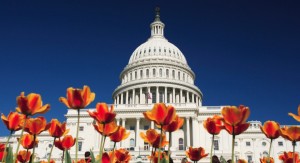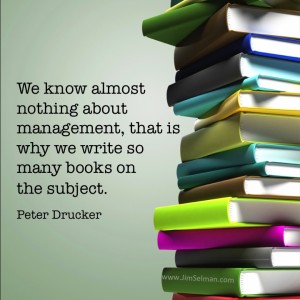Jim Selman and Rinaldo Brutoco of the World Business Academy discuss The Clean Energy Moonshot Project.
Category Archives: Leadership
Who’s Leading? Who’s Responsible for Leadership in Government?
There is a lot of talk in the Public Service about leadership.
We say we need it. The question we don’t ask, however, is
“who is responsible for leadership?” Moreover, if we
stop and reflect, we recognize that leaders don’t lead without
the commitment of those who follow and that uncommitted followers
can destroy any leader no matter how talented or sincere. Leadership
can be a solution to many problems, but it is a solution ONLY IF
we are
The Leadership Paradox
By Jim Selman | Bio
Peter Drucker, who many consider the father of modern management, once said, “We know almost nothing about management, that is why we write so many books on the subject.” The same might be said for leadership. There are more than fifty thousand titles available and hundreds more being published almost every month. Hundreds of millions of dollars are spent annually on countless workshops and courses to train leaders. The question is, with all of these writings,
Stand and Be Counted
By Jim Selman | Bio
We’ve been assaulted lately by political pundits and statisticians telling us what will happen this week. It is easy to roll over and assume they know what they are talking about. So why bother to vote at all? Just sit back and watch the process on TV. This is a particularly easy rationalization for cynics and those who’ve become resigned that they don’t make a difference anyway.
Most of the hype and hysteria seems to be aimed at younger voters. It is assumed
Collaboration: An Endangered Competence?
By Jim Selman | Bio
I cannot remember having experienced or even having read about a time when there have been so many “extremes” co-existing in terms of political points of view and ways of understanding the world. All seem to simultaneously have the quality of being both ‘life threatening’ AND intractable. Whether we’re discussing climate change, social justice, lifestyles, civil rights, the economy, our political process or the price of oil, everyone seems to have a strongly held point of view without much evident interest in learning or working toward some common resolution of our differences. It would seem collaboration is fast becoming extinct—an endangered competence.Collaboration isn’t the same as compromise or negotiation. Collaboration is not about winning an argument or making the strongest case for a particular point of view. Collaboration is grounded in the simple notion that we can’t accomplish something alone. To collaborate means to accept and value our differences, rather than attempting to homogenize our thinking into some sort of bland agreement. Collaboration, like coaching, is primarily a process of creative
The Gulf: Captured By Our Creations
By Jim Selman | Bio
We’re all witnessing the horrifying disaster in the Gulf of Mexico. Most of us are running the gauntlet of emotions from sadness to anger. There is a lot of handwringing as the Gulf Coast girds itself for yet another devastating blow. It is not clear if this will be worse than Katrina, but that possibility looms large. We can rebuild after a hurricane. The damage from an oil spill of this magnitude can last for decades—or for all eternity.No doubt British Petroleum will pay. The Valdez cost Exxon upwards of $5B I’m told. Since these costs get passed on, the fact is that, at the end of the day, we all pay.
Following the Valdez, I was hired by one of Exxon’s subsidiaries to craft an alcohol and drug policy. We worked with about a hundred individuals representing a cross-section of the company from the CEO to ship captains and union representatives to office workers. Over eight weeks, we debated the ‘rules’
Redesigning the World: Listening to Youth
By Shae Hadden
Jennifer Correiro, executive director of TakingITGlobal, sent me an update of her activities at Davos last week. As a Young Global Leader, she has been involved in an initiative to bring recommendations from teenagers in over 20 countries to the Global Redesign Initiative of the World Economic Forum. More than 2,000 people between 8 and 25 took part in an online forum
Ageless Leaders, Ordinary Heroes
Second-Guessing
By Jim Selman | Bio
Over the past few years, I have written about how life in our society is increasingly becoming a ‘spectator sport’. I am again reminded of this as I listen to week after week of pundits second-guessing President Obama and other leaders as if their points of view are a) true, b) somehow contributing to a civil public discourse, and c) honest and not contrived to produce controversy or provoke conflict and drama. I am not naïve: I am aware that the media is in the business of creating and satisfying audiencesand that drama, conflict and controversy sell more than relatively straight-forward information. Personally, I’ve managed to disconnect from the mainstream media channels about 90%, but even so the conversations are persuasive whether we’re getting them first or second-hand. If my observation about all of us is valid that we’re becoming spectators rather than being active participants in the democratic process, then the question becomes what can we do about it? As an example, a majority of us voted for a President and before the ink was dry we began to hear daily ‘score cards’ about his ‘popularity’ and is he doing a good or a bad job. Mostly we’re second-guessing his decisions and undermining his (or anyone’s) capacity to lead. Imagine what it would be like if you got married and then had a daily report by all your neighbors of how the marriage was going and how you were doing as a spouse. Either you’d have to stop listening or you’d end up reacting to the feedback to the point where you are a pawn of public opinion and no longer an actor in the relationship. I admire any leader’s capacity to balance sage advice and counsel from those committed to making things work and their ability to ‘screen’ out all the ‘devil’s advocates’ who have no other commitments than to destroy whatever possibilities may exist for change and/or to forward their own points of view. Lately there is a back-and-forth argument about whether the President is being tough enough on Wall Street. Frankly, I don’t know what his longer-term game plan is, but I would bet the story isn’t finished. He is fighting wars on a dozen fronts. He must pick his battles. He must be strategic. If any president were to declare war on Wall Street, it is not clear who will win and, as has been the case with healthcare, we will, in all likelihood, lose the opportunity to correct and clean up the mess we’ve created.There is very little (if any) benefit to second-guessing our leaders. If we have personal priorities and requests, there are lots of ways for them to be communicated. There are lots of forums for discourse and debate that are not daily ‘spectacles’.
We remember the story of Emperor Nero watching Rome burn. We forget that, for years before it burned, the population was drawn to the Coliseum to watch the gladiators live or die. They voted on the life



